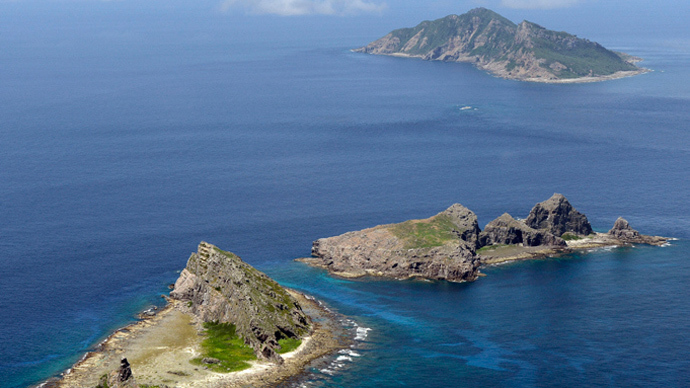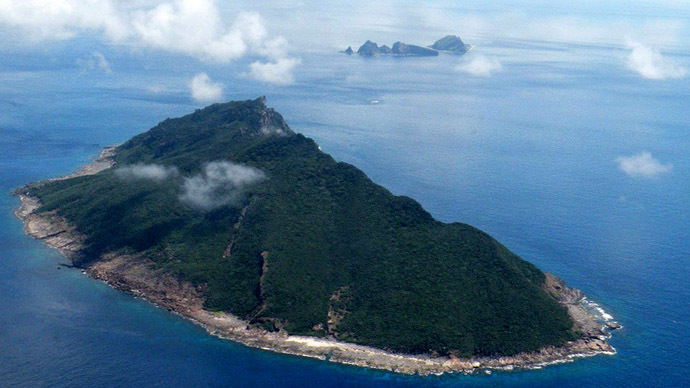US to China: Stop behaving all sovereign!

A favorite lie propagated by Western power elites – especially in the US and Britain – is that globalization is ‘good’ because it bypasses national borders that ‘limit trade, investments, democracy and human rights’.
Which in a more bottom-line parlance means ‘sovereign borders are bad; globalization is good’.
A ‘borderless world’ they call it, as they try to persuade the world to drop national borders and ‘go global’. Everybody, that is, except the US, UK, (and ‘little Israel’). So when China asserts that it is a sovereign state, the White House, Pentagon and their friends go ballistic.
Do as I say, not as I do
The true message is glaringly clear. We are not a borderless world. Territorial integrity and national sovereignty still count. A lot!
In fact, territory counts far more today than ever before since technology has shrunk the rather small planet we 7.5 billion souls live on.
So if Western colonial powers fought to conquer their global empires, subduing countries like India, Japan, China and others in America and Africa when our world was really huge in those under-developed centuries gone by, it is no surprise to see them today fight for total global control down to the last square mile!
China understands this. Russia knows this. Iran and India know this too.
China is particularly sensitive about these issues, having suffered centuries of Western colonial intervention, and last century’s Japanese invasion. A country’s awareness of territorial sovereignty is proportional to the traumatic invasions it has suffered in the past.

Chinese geopolitics
Contrary to the US, UK and their allies, who for centuries strived to achieve and maintain global hegemony, China has a different mind-set on the role it must play in the world; it thinks and acts on quite a different timescale and set of priorities. For China has no global imperial ambitions, preferring to be and remain the dominant power in East Asia and the Western Pacific.
China understands the West’s intentions over that huge sector where two thirds of the world’s population lives; China recognizes Japan’s uneasy pro-West stance – after all Tokyo did lose the Second World War – and China has intelligently resolved historical conflicts with Russia. In fact, both Russia and China understood that as an economic, political and social program, Western Marxist ideology does not work, and both did well to rid themselves of it, even if in different ways.
So whilst China will stand at arm’s length and just look on over what the Western powers do in Africa, Europe, the Middle East, Latin America and elsewhere, it will not tolerate anyone messing around with its own geographical sphere of interest.
China’s short geopolitical statement is clear: stay away from Taiwan; don’t even talk about Tibet; and don’t dare to threaten its mainland sovereign air, sea and land space.
That doesn’t mean China will act like a bullying cowboy drawing its gun on other nations using gangster all-options-are-on-the-table rhetoric, but China will assert itself in no uncertain terms if any irresponsible fool pokes the Dragon’s eye.
For not only is China a full-scale nuclear military superpower, it is also the ‘C’ in ‘BRICS’, where together with Russia it forms BRICS’s heavyweight core that intelligently spans four continents. If anything, the BRICS and its more formal and growing counterpart, the Shanghai Cooperation Organization, are more balanced and inherently consistent than any Western economic, political, even military alliance – whether centered on NATO, the EU, UN, or IMF-World Bank – simply because it is a defensive reaction to confront the Western powers’ offensive global strategies.
Western geopolitics
For quite some time US Pentagon and think-tank planners have ranked China as America’s No.1 long-term enemy. Because of its overwhelming economic growth which will make it the world’s largest economy within a few years’ time; because of its military and technological prowess; and because it has made it clear to the world that never again will it be shoved around as the Western colonial powers once did.
In recent decades, whilst the West was busy shooting itself in the foot in Iraq, Afghanistan, Libya and with its irrational support of Israel, China was busy growing and growing. Whilst the US, UK and EU did everything they could to stir up hatred and opposition in the Muslim world, Latin America and Africa thanks to their usury-driven greedy ‘profit-über-alles’ mega-bankers, China was busy investing, acquiring resources and striking shrewd trade agreements all over the world.
Whilst the US (particularly) and its political and military allies have sunk into bottomless out-of-control debt, China grew its monetary reserves and financial assets holding the US dollar at ransom, and – more importantly – consolidating its access to key natural resources in all five continents.
Above all BRICS is a defensive reaction to the Western power’s offensive global strategies, for the West consistent and dangerously meddles in parts of the world it has no business poking its nose into.
What on earth are US B-52 bombers doing flying around Chinese airspace (even if still not recognized by the US and its underdog allies Japan and South Korea)?
What would the UK say if Chinese bombers were to fly near the coasts of Scotland just to underline Chinese support of the Scottish independence movement?
What would US air defenses do if two or three Chinese and Russian bombers were to fly the skies near the US-Canadian Atlantic coastline on stand-by in case Quebec were to finally decide to break away from the Canadian Union?
Double standards, double-talk, misrepresentation and outright lying lie at the heart of the Western global strategies. This is manifested not just by its dragging client allies like Japan and South Korea, or just by exercising B52 and Navy warship muscle power. More importantly, it includes global PsyWar from its aligned mainstream media that ensures Western public opinion is kept in the dark regarding the real causes, origins and detonators of global crisis after global crisis; whether in the Middle East, Africa, Europe, Asia or Latin America; whether in the wake of 9/11, Wall Street’s collapse or mega-banker quantitative easing rip-offs.

French-German roadmap for China & Japan?
History never repeats itself, so no country should ever imitate outright what other countries have done in the past, even if that resulted in major political breakthroughs. History can, however, be a great teacher of true statesmen if they can see the parallels, draw the right conclusions and understand the recurring, often subtle, threats and opportunities that nations constantly confront throughout decades and centuries.
After the huge traumas of invasion, death, destruction, humiliation and pain the Second World War wrought upon France and Germany, their exceptional post-War leaderships showed that they had learned their lessons, even if it was the hard way.
It was thanks to two of modern history’s greatest statesmen – Charles De Gaulle of France and Konrad Adenauer of Germany – that these two countries looked at each other straight in the eye and understood that waging major wars in 1870, 1914-18 and then 1939-45 resulted in their own and Europe’s defeat by the US, the USSR and perfidious Albion.
France and Germany realized it was time to tread down a different road: the road of mutual respect, understanding, balancing their common interests and goals.
France recognized in Germany Europe’s economic and industrial powerhouse, whilst Germany understood that after the Third Reich only France could become the geopolitical leader of a unified Europe.
A great example that China and Japan would do well to heed. True that after De Gaulle and Adenauer left the scene no other Statesmen came to the helm of their countries, but then again it’s been decades since any statesman has come to the helm of any country in Europe, the US or most Western countries. And it’s also true that if De Gaulle and Adenauer could see the grotesque mess the European Union has been turned into they would roll in their graves. Nevertheless the idea behind a European Union were markers going in the right direction protecting Europe against America’s conceited exceptionalism, Britain’s devious divide-and-conquer tactics, and the former Soviet threats of invasion.
Chinese President Xi Jinping and Japanese Prime Minister Shinzo Abe would thus do well to stop bickering.
Japan should stop playing into US Pentagon planners' hands: they are just dying to have a good excuse to move its fleets and bombers en masse into the Western Pacific, and realize that Japan’s National Interest is definitely not about the tiny Diaoyu-Senkaku islands lying on the East China Sea.
Japan should accept China’s well-deserved status as the dominant power in the region by making amends for its past aggressions in Manchuria and Korea, and look to the future by dealing with its own past.
Japan’s natural ally is not the US and the Western Powers, but rather China as Asia’s industrial, financial and geopolitical powerhouse. Allied to Japan as regional leading-edge technological powerhouse, they would be unstoppable.

Japan: Carpe diem!
Both China and Japan would do well to drop Marxist internationalism, ignore Rothschild bankers, kick out the Rockefeller Trilateral Commission and rout Bilderberg’s decadent seducers. They should instead come together to defend Asian common interests together with their Russian and Indian partners.
Imagine if Japan were to join the BRICS powerhouse? That would add a needed touch of Zen wisdom and Aikido brinkmanship to China’s more practical Sun-Tzu strategies. But first we need to have a 180-degree about face in Tokyo so that it looks less eastwards to America, and more westwards towards China.
The world’s center of gravity is fast shifting. China (and Russia) is the direction to face, whilst America, the UK and their allies are fast imploding. We see it in the irreversible demise of the US dollar, in the mess they turned the Middle East into, in the complete lack of trust they have inspired the world over, and in their successive failures in Iraq, Afghanistan, Syria, Iran, Wall Street and Main Street.
To conclude, Japan is a pivot. It should follow the recent examples of China, Russia, Iran, India, and of lesser powers like Brazil and even vanquished Libya: act sovereign!
History opens few windows of opportunity for countries to do that. If done at the right time and in the right circumstances, it can make a thousand-year difference.
So Japan: now’s the time. Forget your bully US big-brother… Look around: at your own historical, social, religious and political roots and traditions. Meditate on all this and the answer will shine forth clearly. It’s all Zen: just do it!
The statements, views and opinions expressed in this column are solely those of the author and do not necessarily represent those of RT.
The statements, views and opinions expressed in this column are solely those of the author and do not necessarily represent those of RT.













